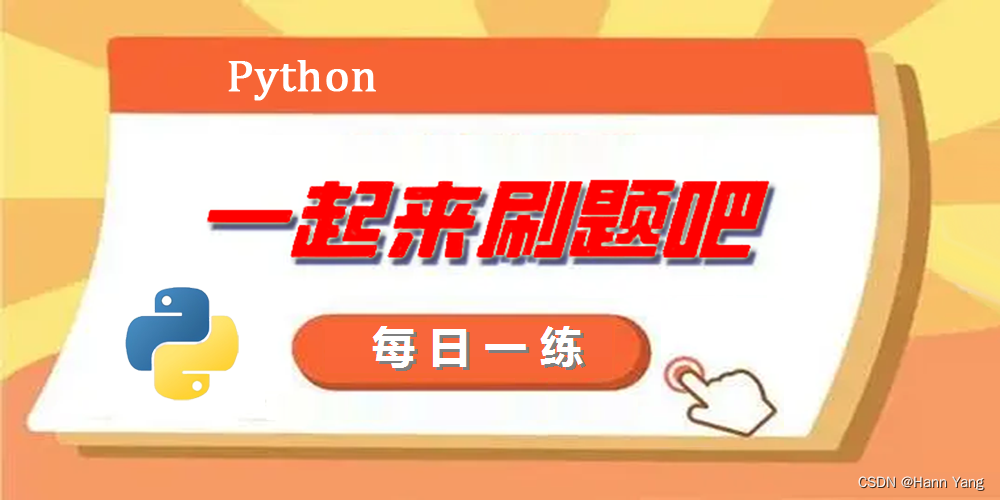Python每日一练(20230319)

目录
1. 有效的括号 ★
2. 简化路径 ★★
3. 整数转换英文表示 ★★★
🌟 每日一练刷题专栏 🌟
Golang每日一练 专栏
Python每日一练 专栏
C/C++每日一练 专栏
Java每日一练 专栏
1. 有效的括号
给定一个只包括 '(',')','{','}','[',']' 的字符串 s ,判断字符串是否有效。
有效字符串需满足:
- 左括号必须用相同类型的右括号闭合。
- 左括号必须以正确的顺序闭合。
示例 1:
输入:s = "()" 输出:true
示例 2:
输入:s = "()[]{}"
输出:true
示例 3:
输入:s = "(]" 输出:false
示例 4:
输入:s = "([)]" 输出:false
示例 5:
输入:s = "{[]}"
输出:true
提示:
1 <= s.length <= 10^4s仅由括号'()[]{}'组成
出处:
https://edu.csdn.net/practice/23155480
代码:
class Solution:def isValid(self, s: str) -> bool:parentheses = ['(', '[', '{',')', ']', '}']i = 0sum = [0, 0, 0]top = []while i < len(s):c = s[i]j = 0while j <= 2:if c == parentheses[j]:top.append(j)sum[j] += 1elif c == parentheses[j+3]:if len(top) == 0 or top[len(top)-1] != j:return Falsetop.pop()sum[j] -= 1j += 1i += 1if sum[0] != 0 or sum[1] != 0 or sum[2] != 0:return Falseelse:return True
# %%
s = Solution()
print(s.isValid(s = "()[]{}"))
print(s.isValid(s = "(]"))
print(s.isValid(s = "([)]"))
print(s.isValid(s = "{[]}"))
输出:
True
False
False
True
进阶:
class Solution:def isValid(self, s: str) -> bool:stack = []for c in s:if c in ['(', '[', '{']:stack.append(c)else:if not stack:return Falseif c == ')' and stack.pop() != '(':return Falseif c == ']' and stack.pop() != '[':return Falseif c == '}' and stack.pop() != '{':return Falsereturn not stack
# %%
s = Solution()
print(s.isValid(s = "()[]{}"))
print(s.isValid(s = "(]"))
print(s.isValid(s = "([)]"))
print(s.isValid(s = "{[]}"))
2. 简化路径
给你一个字符串 path ,表示指向某一文件或目录的 Unix 风格 绝对路径 (以 '/' 开头),请你将其转化为更加简洁的规范路径。
在 Unix 风格的文件系统中,一个点(.)表示当前目录本身;此外,两个点 (..) 表示将目录切换到上一级(指向父目录);两者都可以是复杂相对路径的组成部分。任意多个连续的斜杠(即,'//')都被视为单个斜杠 '/' 。 对于此问题,任何其他格式的点(例如,'...')均被视为文件/目录名称。
请注意,返回的 规范路径 必须遵循下述格式:
- 始终以斜杠
'/'开头。 - 两个目录名之间必须只有一个斜杠
'/'。 - 最后一个目录名(如果存在)不能 以
'/'结尾。 - 此外,路径仅包含从根目录到目标文件或目录的路径上的目录(即,不含
'.'或'..')。
返回简化后得到的 规范路径 。
示例 1:
输入:path = "/home/" 输出:"/home" 解释:注意,最后一个目录名后面没有斜杠。
示例 2:
输入:path = "/../" 输出:"/" 解释:从根目录向上一级是不可行的,因为根目录是你可以到达的最高级。
示例 3:
输入:path = "/home//foo/" 输出:"/home/foo" 解释:在规范路径中,多个连续斜杠需要用一个斜杠替换。
示例 4:
输入:path = "/a/./b/../../c/" 输出:"/c"
提示:
1 <= path.length <= 3000path由英文字母,数字,'.','/'或'_'组成。path是一个有效的 Unix 风格绝对路径。
出处:
https://edu.csdn.net/practice/23155482
代码:
class Solution(object):def simplifyPath(self, path):""":type path: str:rtype: str"""result = []plist = path.split('/')for pos in plist:if pos:if pos == '..':try:result.pop()except:result = []elif pos != '.':result.append(pos)return '/'+'/'.join(result)# %%
s = Solution()
print(s.simplifyPath(path = "/home/"))
print(s.simplifyPath(path = "/../"))
print(s.simplifyPath(path = "/home//foo/"))
print(s.simplifyPath(path = "/a/./b/../../c/"))
代码2:
class Solution:def simplifyPath(self, path: str) -> str:def simplify(path_list):stack = []for p in path_list:if p == '..':if stack:stack.pop()elif p != '.' and p:stack.append(p)return '/' + '/'.join(stack)return simplify(path.split('/'))# %%
s = Solution()
print(s.simplifyPath(path = "/home/"))
print(s.simplifyPath(path = "/../"))
print(s.simplifyPath(path = "/home//foo/"))
print(s.simplifyPath(path = "/a/./b/../../c/"))输出:
/home
/
/home/foo
/c
3. 整数转换英文表示
将非负整数 num 转换为其对应的英文表示。
示例 1:
输入:num = 123 输出:"One Hundred Twenty Three"
示例 2:
输入:num = 12345 输出:"Twelve Thousand Three Hundred Forty Five"
示例 3:
输入:num = 1234567 输出:"One Million Two Hundred Thirty Four Thousand Five Hundred Sixty Seven"
示例 4:
输入:num = 1234567891 输出:"One Billion Two Hundred Thirty Four Million Five Hundred Sixty Seven Thousand Eight Hundred Ninety One"
提示:
0 <= num <= 2^31 - 1
出处:
https://edu.csdn.net/practice/23155481
代码:
class Solution(object):def numberToWords(self, num):""":type num: int:rtype: str"""def helper(num): n = int(num)num = str(n)if n < 100:return subhelper(num)else:return ["One", "Two", "Three", "Four", "Five", "Six", "Seven", "Eight", "Nine"][int(num[0]) - 1] + " Hundred " + subhelper(num[1:]) if num[1:] != "00" else ["One", "Two", "Three", "Four", "Five", "Six", "Seven", "Eight", "Nine"][int(num[0]) - 1] + " Hundred"def subhelper(num): n = int(num)l1 = ["Zero", "One", "Two", "Three", "Four", "Five", "Six", "Seven", "Eight", "Nine"]l2 = ["Ten", "Eleven", "Twelve", "Thirteen", "Fourteen", "Fifteen", "Sixteen", "Seventeen", "Eighteen", "Nineteen"]l3 = ["Twenty", "Thirty", "Forty", "Fifty", "Sixty", "Seventy", "Eighty", "Ninety"]if n < 10:return l1[int(num)]if 10 <= n < 20:return l2[n - 10]if 20 <= n < 100:return l3[int(num[0]) - 2] + " " + l1[int(num[1])] if num[1] != "0" else l3[int(num[0]) - 2]res = ""if num >= 1000000000:res = helper(str(num)[0]) + " Billion"if str(num)[1:4] != "000":res += " " + helper(str(num)[1:4]) + " Million"if str(num)[4:7] != "000":res += " " + helper(str(num)[4:7]) + " Thousand"if str(num)[7:] != "000":res += " " + helper(str(num)[7:])elif num >= 1000000:res = helper(str(num)[:-6]) + " Million"if str(num)[-6:-3] != "000":res += " " + helper(str(num)[-6:-3]) + " Thousand"if str(num)[-3:] != "000":res += " " + helper(str(num)[-3:])elif num >= 1000:res = helper(str(num)[:-3]) + " Thousand"if str(num)[-3:] != "000":res += " " + helper(str(num)[-3:])else:return helper(str(num))return res# %%
s = Solution()
print(s.numberToWords(123))
print(s.numberToWords(1234))
print(s.numberToWords(1234567))
print(s.numberToWords(1234567891))
代码2:
class Solution:def numberToWords(self, num: int) -> str:if num == 0:return 'Zero'def to_words(n):ones = ['', 'One', 'Two', 'Three', 'Four', 'Five', 'Six', 'Seven', 'Eight', 'Nine']tens = ['', 'Ten', 'Twenty', 'Thirty', 'Forty', 'Fifty', 'Sixty', 'Seventy', 'Eighty', 'Ninety']teens = ['', 'Eleven', 'Twelve', 'Thirteen', 'Fourteen', 'Fifteen', 'Sixteen', 'Seventeen', 'Eighteen', 'Nineteen']if n == 0:return ''elif n < 10:return ones[n]elif n < 20:return teens[n % 10]elif n < 100:return tens[n // 10] + ' ' + to_words(n % 10)elif n < 1000:return ones[n // 100] + ' Hundred ' + to_words(n % 100)elif n < 1000000:return to_words(n // 1000) + ' Thousand ' + to_words(n % 1000)elif n < 1000000000:return to_words(n // 1000000) + ' Million ' + to_words(n % 1000000)else:return to_words(n // 1000000000) + ' Billion ' + to_words(n % 1000000000)return to_words(num).strip()# %%
s = Solution()
print(s.numberToWords(123))
print(s.numberToWords(1234))
print(s.numberToWords(1234567))
print(s.numberToWords(1234567891))
输出:
One Hundred Twenty Three
One Thousand Two Hundred Thirty Four
One Million Two Hundred Thirty Four Thousand Five Hundred Sixty Seven
One Billion Two Hundred Thirty Four Million Five Hundred Sixty Seven Thousand Eight Hundred Ninety One
🌟 每日一练刷题专栏 🌟
✨ 持续,努力奋斗做强刷题搬运工!
👍 点赞,你的认可是我坚持的动力!
🌟 收藏,你的青睐是我努力的方向!
✎ 评论,你的意见是我进步的财富!
 | Golang每日一练 专栏 |
 | Python每日一练 专栏 |
 | C/C++每日一练 专栏 |
 | Java每日一练 专栏 |
